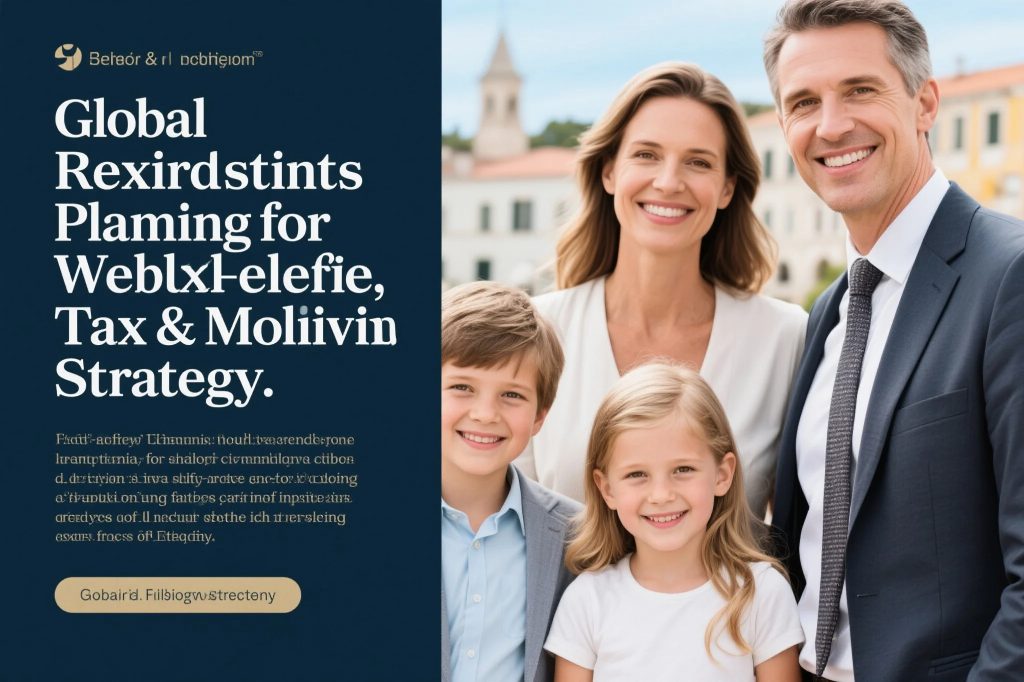
Understanding the Essentials of Global Mobility for Wealthy Families
In today’s interconnected world, global mobility has become an increasingly important consideration for wealthy families seeking to optimize their lifestyle, financial position, and long-term legacy. The ability to move freely across borders, establish multiple residences, and access diverse opportunities is no longer a luxury but a strategic necessity for many high-net-worth individuals. This trend reflects a globalized economy where economic hubs, tax regimes, and quality of life vary significantly, creating both challenges and opportunities for those with substantial wealth.
Global mobility involves much more than simply having a second passport or owning property overseas. It encompasses the intricate planning required to align residency, taxation, legal compliance, and family needs. Wealthy families must navigate complex immigration laws, varying tax residency criteria, and estate planning regulations that differ from country to country. These factors collectively influence not just where they live, but how their wealth is preserved, grown, and passed on to future generations.
The importance of global mobility extends to lifestyle benefits as well. Many wealthy families value the flexibility to live in jurisdictions offering superior healthcare, education, security, and political stability. Access to world-class services, diverse cultural environments, and business ecosystems can enhance personal fulfillment and professional opportunities. Furthermore, the ability to relocate a family office relocation or assets to favorable jurisdictions can enhance governance, privacy, and financial efficiency.
Successful global mobility planning demands a holistic approach, involving legal, tax, and financial advisors who understand international landscapes. Families that invest in such strategic planning can better protect their wealth from adverse tax consequences, political risks, and regulatory changes while enhancing their global lifestyle options. As globalization accelerates, mastering global mobility is becoming a cornerstone of modern wealth management and legacy planning.
Tax Residency: Defining Where You Belong for Fiscal Purposes
At the heart of global residency planning is the concept of tax residency. This designation determines where an individual or family is subject to income, capital gains, inheritance, and other taxes, often with profound financial consequences. Understanding and managing tax residency is therefore critical for high-net-worth families aiming to legally minimize tax liabilities while maintaining compliance with global tax laws.
Tax residency rules vary widely by jurisdiction, typically relying on physical presence tests, domicile status, or other criteria such as permanent home availability. For example, some countries use a day-count test, whereby spending more than a specified number of days in the country establishes residency. Others use a more subjective test of “center of vital interests,” focusing on where personal and economic ties are strongest. Navigating these nuances requires expert guidance, especially for families with multiple residences and cross-border ties.
Strategic tax residency planning often involves selecting jurisdictions with favorable tax regimes, such as those with no wealth tax, capital gains tax, or inheritance tax. Many wealthy families establish residency in countries with double taxation treaties to prevent being taxed on the same income twice. This careful choreography allows for optimization of global tax exposure, protecting more of the family’s wealth while adhering to legal requirements.
Additionally, families must consider exit taxes, compliance reporting, and anti-avoidance measures implemented by countries to curb tax evasion. Managing these risks involves maintaining proper documentation, timely filing of tax returns, and transparency with authorities. As global tax enforcement intensifies, sophisticated residency planning becomes indispensable for families seeking to preserve their wealth without crossing legal boundaries.
The Rising Importance of HNW Immigration Strategies
For affluent families, immigration is no longer just about relocating for personal reasons; it is an essential facet of wealth planning and preservation. HNW immigration programs, including investor visas, citizenship-by-investment schemes, and residence permits, have proliferated worldwide, offering wealthy individuals and families pathways to enhance their global options.
Investor visa programs typically require a significant capital investment in real estate, government bonds, or business ventures in exchange for residency rights. These programs provide expedited access to residency or citizenship in countries that offer tax advantages, political stability, and lifestyle benefits. Choosing the right immigration program requires analyzing the cost-benefit balance, legal complexities, and long-term implications for family members.
Many HNW families leverage immigration programs as tools to diversify geopolitical risk. Establishing multiple citizenships or residencies can protect against instability in any single country and provide greater freedom of movement globally. Moreover, access to different education systems, healthcare, and business environments can significantly enhance family opportunities and security.
Effective HNW immigration strategies align closely with broader estate planning goals. They facilitate succession planning by enabling smoother cross-border wealth transfers, reducing exposure to punitive taxes, and securing legal protections. Advisors often help families integrate immigration with wealth preservation strategies, ensuring a comprehensive plan that considers all dimensions of family wealth and mobility.
Family Office Relocation: Enhancing Governance and Operational Efficiency
As wealthy families expand their global footprint, the strategic relocation of their family office becomes an important consideration. Family offices serve as the centralized hub for managing investments, legal affairs, philanthropy, and intergenerational wealth transfer, and their location can have significant implications for governance, operational efficiency, and privacy.
Relocating a family office to a jurisdiction with favorable regulatory environments and tax policies can streamline administrative processes and reduce compliance costs. Jurisdictions known for robust legal protections, political stability, and advanced financial infrastructure often attract family offices seeking to optimize their operations. In addition, proximity to global financial centers and service providers facilitates access to a wider range of investment opportunities and expert advice.
Privacy and confidentiality are also paramount considerations. Certain jurisdictions offer enhanced privacy protections, shielding family wealth from unwanted scrutiny. This can be especially important for families wishing to maintain discretion in their financial affairs and philanthropic activities.
Moreover, relocating a family office can support the family’s broader mobility goals by aligning with the physical location of key family members, enabling better coordination, and fostering stronger family governance. The move often involves detailed planning to address legal, tax, staffing, and technological aspects, ensuring continuity and minimal disruption. Thus, family office relocation is a strategic tool that complements global mobility and estate planning objectives.

Integrating Estate Planning Within Global Residency Strategies
Robust estate planning is integral to successful global residency planning. Wealthy families must carefully structure their assets and succession arrangements to address the complexities introduced by multiple jurisdictions. This involves understanding diverse inheritance laws, probate requirements, and tax regimes to avoid unintended consequences and preserve wealth for future generations.
Cross-border estate planning often employs trusts, foundations, and other legal entities designed to provide flexibility, asset protection, and tax efficiency. These vehicles help families manage wealth distribution according to their wishes, regardless of the location of beneficiaries or assets. Legal experts work to harmonize estate plans across jurisdictions, ensuring compliance while maximizing benefits.
One critical challenge is mitigating the risk of double taxation or excessive estate taxes, which can erode family wealth if not properly managed. Tax treaties, careful asset titling, and strategic use of exemptions help reduce tax exposure. Additionally, estate planning integrates with residency and citizenship decisions, as these affect tax liabilities and inheritance rights.
Equally important is the coordination of family governance structures within estate plans. Clear communication of family values, decision-making protocols, and conflict resolution mechanisms helps preserve family harmony and ensures that wealth stewardship transcends generations. This alignment between legal, financial, and personal elements forms the backbone of a resilient and adaptive global wealth strategy.
Conclusion: Crafting a Comprehensive Global Residency Plan for Enduring Wealth
The complexity of global residency planning for wealthy families demands a multifaceted approach that balances tax residency, hnw immigration, family office relocation, and estate planning. By embracing the full spectrum of opportunities and challenges, families can achieve greater financial efficiency, enhanced personal freedom, and long-lasting legacy preservation.
Careful navigation of diverse legal frameworks, tax regimes, and lifestyle considerations requires collaboration with expert advisors who understand the nuances of international wealth management. Families that invest in thoughtful global residency strategies unlock not only tax and mobility advantages but also the ability to safeguard and grow wealth across generations.
Ultimately, global residency planning empowers wealthy families to craft their ideal life path—free from unnecessary tax burdens, enriched by diverse opportunities, and anchored in a sustainable plan that transcends borders and time. This strategic integration of mobility and wealth preservation will continue to define the future of high-net-worth family planning in an increasingly globalized world.